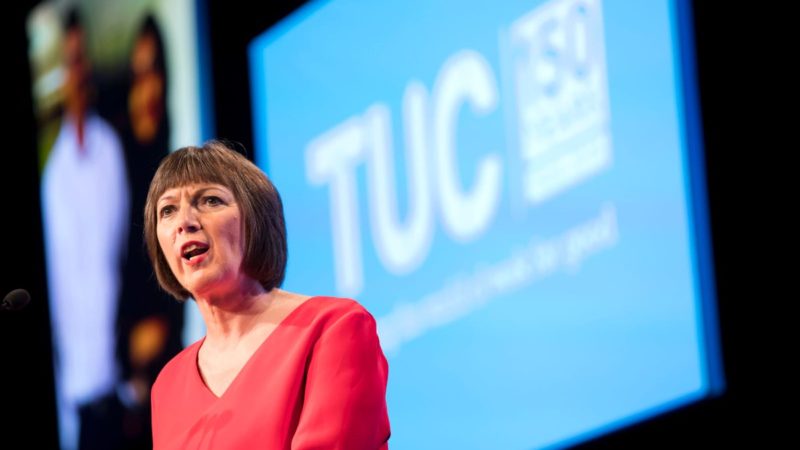
Frances O’Grady has declared that it is time to “lift the burden of failed privatisation off families” after the TUC unveiled a plan to keep household energy bills down through public ownership of energy companies.
The affordable energy plan, published by the federation of unions today, states that nationalisation could reduce energy bills by: ending shareholder dividends; making more money available to cut bills; creating incentives to make homes more energy efficient; and enabling pricing structures with lower costs for basic energy needs.
The TUC argued that public ownership would not only cut energy bills but also speed up energy efficiency improvements to homes and cut carbon emissions faster.
TUC general secretary O’Grady said: “Families should be able to afford their basic energy needs. But energy firms rinsed us for private profit in the good times, then doubled our bills when the going got tough. That’s why bills are soaring now.
“It is time to lift the burden of failed privatisation off families. No more shareholder pay-outs. No more fat cat bonuses. No more take-the money-and run-companies that collapse overnight. Just fair prices from an energy company owned by us all and run for our benefit.”
The government has spent £2.7bn since June 2021 bailing out energy companies. The TUC estimated that nationalising the ‘big five’ energy retail companies – British Gas, E.ON, EDF, Scottish Power and Ovo – would cost £2.85bn.
Ministers have so far committed £12bn to help cut the cost of household bills. But the TUC argues that if energy firms had been in public ownership, bills could have been kept down at a lower cost to the public purse.
The TUC cited France as an example, where national provider EDF is 84% publicly owned. Household energy bills in France increased by just 4% this year.
Ofgem is expected to announce a further increase to the energy price cap next month, which could bring the average energy bill to more than £3,200 – a rise of more than 150% in one year.
The TUC argued that bringing energy companies into public ownership would mean money currently spent on shareholder dividends could instead be used to reduce bills and bring forward energy efficiency measures.
The trade union body concluded that publicly-owned energy companies would have a stronger incentive to introduce energy efficiency improvements to homes and have the power to set energy prices prioritising affordability for customers, rather than maximising profits for shareholders.
Its plan outlines how a publicly-owned energy retail system could establish a social pricing structure under which everyone is able to afford the energy they need while those with “extravagant energy use” pay more per unit.
Under the plan, every household would receive a free band of energy to cover basic lighting, heating, hot water and cooking. Bills for low-income families would be capped at 5% of typical household income.
Commenting on the proposal, O’Grady said: “Everyone should have enough affordable energy to cook, clean and keep their home warm. But anyone heating a private swimming pool should expect to pay a higher rate for their luxury lifestyle.”
Appearing on BBC Radio 4’s Today programme this morning, Rachel Reeves said the nationalisation of rail, energy and water “just doesn’t stack up against our fiscal rules” in what appeared to be a rejection of nationalisation.
The Shadow Chancellor told listeners that the party’s commitment under Jeremy Corbyn to bring certain industries into public ownership in 2019 had been part of a manifesto that “secured our worst results since 1935”.
Following the interview, a Labour Party spokesperson clarified: “We are pragmatic about public ownership as long as it sits within our fiscal rules – a point Rachel was underlining in the interview by referencing this framework. For example, we know there is a positive role for rail in public ownership.”
In a question-and-answer session following a speech in Liverpool earlier today, Keir Starmer was asked for his views on common ownership. The Labour leader said: “I take a pragmatic approach rather than an ideological one and agree with what Rachel Reeves said this morning.
“Having come through the pandemic, it’s very important that we have very, very clear priorities, and that’s why we’ve set our fiscal rules already as an opposition.”




More from LabourList
Josh Simons resigns as Cabinet Office minister amid investigation
‘After years of cuts, Labour’s local government settlement begins to put things right’
‘The Sherriff of Wild Westminster: what must change in elections bill’